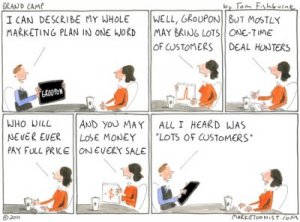TrueCar is facing a mounting groundswell of criticism. Without addressing whether they are good or bad for car dealers (I certainly have my own opinion on that), let’s look at how they’ve handled the criticism. I think dealers could learn a few lessons on how NOT to handle critics.
Earlier this week there was a flurry of blog posts in various dealer communities as well as some YouTube videos discussing the concept behind TrueCar and asking if it was good for the industry. TrueCar stayed pretty silent until they saw this video:
No, you can’t see it any longer because TrueCar claimed that the few screenshots included in the video constituted a copyright infringement. The screenshots were clearly Fair Use as the law states the following; “criticism, comment, news reporting, teaching (including multiple copies for classroom use), scholarship, or research, is not an infringement of copyright” - it’s considered fair use.
But my point isn’t whether putting a muzzle on Jerry Thibeau was right or wrong, my point is; was it smart?
I’d never hear of the Streisand Effect till I read about it here in the DR Forums in this post from Art Morris. The Streisand Effect basically says the more you attempt to hide or remove a piece of information, the more the information is publicized. That’s what’s happening to TrueCar right now. Their crisis management blunder has led to this video and more blog posts than they know what to do with:
How could they have handled it? Look at Groupon. They faced a blog post that went a little viral, calling the service “the single worst decision I have ever made”. Groupon stayed quiet for a few days and then posted a well written response on their blog. What they didn’t do was try to gag the merchant. They knew that would backfire.

The lesson for dealers? When you face criticism, don’t try to shut the critics down, answer the criticism as well as you can. If you don’t already have a plan, start developing one today. My sense is TrueCar didn’t have such a plan, and if they did, it was a poor one.
Earlier this week there was a flurry of blog posts in various dealer communities as well as some YouTube videos discussing the concept behind TrueCar and asking if it was good for the industry. TrueCar stayed pretty silent until they saw this video:
No, you can’t see it any longer because TrueCar claimed that the few screenshots included in the video constituted a copyright infringement. The screenshots were clearly Fair Use as the law states the following; “criticism, comment, news reporting, teaching (including multiple copies for classroom use), scholarship, or research, is not an infringement of copyright” - it’s considered fair use.
But my point isn’t whether putting a muzzle on Jerry Thibeau was right or wrong, my point is; was it smart?
I’d never hear of the Streisand Effect till I read about it here in the DR Forums in this post from Art Morris. The Streisand Effect basically says the more you attempt to hide or remove a piece of information, the more the information is publicized. That’s what’s happening to TrueCar right now. Their crisis management blunder has led to this video and more blog posts than they know what to do with:
How could they have handled it? Look at Groupon. They faced a blog post that went a little viral, calling the service “the single worst decision I have ever made”. Groupon stayed quiet for a few days and then posted a well written response on their blog. What they didn’t do was try to gag the merchant. They knew that would backfire.

The lesson for dealers? When you face criticism, don’t try to shut the critics down, answer the criticism as well as you can. If you don’t already have a plan, start developing one today. My sense is TrueCar didn’t have such a plan, and if they did, it was a poor one.








